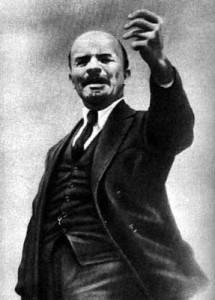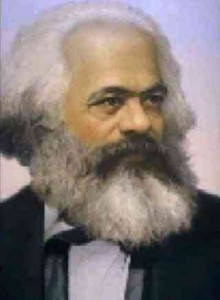Karl Marx writes in the sixth paragraph of the Preface to A Contribution to the Critique of Political Economy (1859):
“In the social production of their existence, men inevitably enter into definite relations, which are independent of their will, namely relations of production appropriate to a given stage in the development of their material forces of production. The totality of these relations of production constitutes the economic structure of society, the real foundation, on which arises a legal and political superstructure and to which correspond definite forms of social consciousness. The mode of production of material life conditions the general process of social, political and intellectual life. It is not the consciousness of men that determines their existence, but their social existence that determines their consciousness. At a certain stage of development, the material productive forces of society come into conflict with the existing relations of production or – this merely expresses the same thing in legal terms – with the property relations within the framework of which they have operated hitherto. From forms of development of the productive forces these relations turn into their fetters. Then begins an era of social revolution. The changes in the economic foundation lead sooner or later to the transformation of the whole immense superstructure.â€
Marx teaches us that “The mode of production of material life conditions the general process of social, political and intellectual life.”
In a previous post on this website “Frederick Engels on Bukunin’s School of Anarchy”, A. Shaw notes that Engels made the case that Anarchists view the state as the ultimate evil and routinely abstain from the political struggle in any meaningful way. In short, Anarchists have a phobia of political struggle. They are extremely successful in persuading people on the left, people of conscience and progressives generally from participating fully in the political struggle in the United States. This is easily confirmed by the pathetic numbers of people who vote.
According to Time magazine, the 2014 midterm elections voter turnout reached a 72 year low and only 36.4% of eligible voters actually voted. Researchers Martin Gilens and Benjamin I. Page maintained that the US political system has transformed from a democracy into an oligarchy where wealthy elites control most political power. The researchers maintain
“The central point that emerges from our research is that economic elites and organized groups representing business interests have substantial independent impacts on U.S. government policy,” they write, “while mass-based interest groups and average citizens have little or no independent influence.”
If this is true, then it is obvious that those people who control the means of production in the United States control the political process as well. The people who control the means of production in the United States, obviously, are the capitalist class, commonly referred to as the 1%.
Marx taught us and examination of the current mode of production easily reveals that market economies are anarchistic in form and content. In other words, market economies are ideologically anarchistic.
Dictionary definitions of anarchism include components such as “rejection of authority” and “absence of government and absolute freedom of the individual, regarded as a political ideal.” Synonyms of anarchy include “lawlessness, nihilism, disorder, chaos, mayhem, tumult, turmoil.†It should be pointed out that nihilism, particularly that form of nihilism expressed by Friedrich Nietzsche, was the dominant ideology of Nazi Germany.
Few would argue that there is no worship of the “absolute freedom of the individual” in the US today.
Few would argue that the distribution of wealth in the USA is not uneven and that the market economy of the US is not chaotic.
An examination of current social relations in the USA reveals absolute anarchy in social, intellectual and political life. Mainstream media conceals the reality of the conduct of the US government every day. Low voter turnout hands elections over to the 1% without a fight. Movies, video games and the Internet have produced a culture based on violence and chaos never before seen in the history of mankind.
Lawlessness, including police terrorism, is rampant across the nation.
The US military violates international law and terrorizes working people around the globe.
Economic warfare waged by the US ruling class creates chaos, anarchy, terror and psychological dysfunction domestically and internationally.
Bizarre behavior among humans in the USA has become the new norm. All of this is a reflection of the chaos and anarchy of the mode of production, i.e. the market economy.
In his “Letters on Tactics”, Lenin defined revolution as the passing of state power from one class to another.
People on the left in the United States give a lot of lip service to “revolution.” However, all too often people on the left equate revolution with anarchy. They don’t seem to have a clue about how to acquire state power. Of course, by playing into the hands of the anarchists, people on the left play into the hands of the capitalists.
Anarchists, because of their phobia of political struggle, routinely abstain from meaningful political activity. Abstention from political activity is abstention from the struggle to acquire state power. Abstention from political activity is therefore abstention from revolution. Abstention from revolution means a free ride for the 1%. Anarchy is therefore antithetical to revolutionary struggle.
People in the US have a choice in front of them. They can continue to worship individualism and anarchy and abdicate their political power to the 1% or they can unite, organize and fight for the interests of working people which include accessible education, healthcare, housing, legal justice and freedom from oppression, exploitation and racism in all its forms. So, working people must choose between anarchy or revolution.
Tue Jan 06, 2015 at 09:28 AM PST
http://www.dailykos.com/story/2015/01/06/1355899/-NAACP-Legal-Defense-Fund-files-a-potential-game-changer?showAll=yes

At a time when most people have given up on any semblance of justice for slain Ferguson teenager Mike Brown, Sherrilyn Ifill and the NAACP Legal Defense Fund have made what may be the biggest game changing request in the case yet.According to Missouri law, a Missouri Circuit Court Judge has the power to appoint a Special Prosecutor in any case in which a citizen has not yet been indicted and prosecutorial misconduct is alleged. The judge with jurisdiction in the case against former Ferguson Police Officer Darren Wilson is Maura McShane.
The NAACP Legal Defense Fund, in their open letter to McShane, makes an extremely compelling case for misconduct by St. Louis Prosecutor Bob McCullough and his staff. In the nine-page letter, Ifill and the NAACP LDF thoroughly detail three instances of misconduct. One is enough to appoint a special prosecutor.
In summary the letter details the following:
1. How prosecutors violated Missouri law and professional ethics for calling a witness they’ve since admitted they knew did not witness the shooting and was not at the scene. They not only called her once, but twice, and encouraged her to bring physical evidence on her second visit. This witness, Sandy McElroy, perjured herself over 100 times.
2. Prosecutors consistently made documented mistakes in the essential instructions they gave to the grand jurors. MSNBC’s Lawrence O’Donnell masterfully details one such mistake here.
3. Legal analysts and now an actual member of the grand jury felt strongly that Bob McCulloch and his team acted as de facto defense attorneys for Darren Wilson and that it often appeared as if Mike Brown was on trial instead of Darren Wilson.
Please read the full letter from Sherrilyn Ifill below.
http://www.dailykos.com/story/2015/01/06/1355899/-NAACP-Legal-Defense-Fund-files-a-potential-game-changer?showAll=yes
 http://nymetrocommunistparty.org/?p=815
by Jessica Coco, PCUSA Women’s Commission
The “Broken Windows†theory of policing has shaped New York City since the 1990’s, with police under tons of pressure to make arrests and issue summonses for nonviolent offenses that aren’t even against the law – anything to get poor people and people of color out of public view, and make the city safe for business and real estate to jack up the rents and make middle- and upper-class New Yorkers feel safer.














